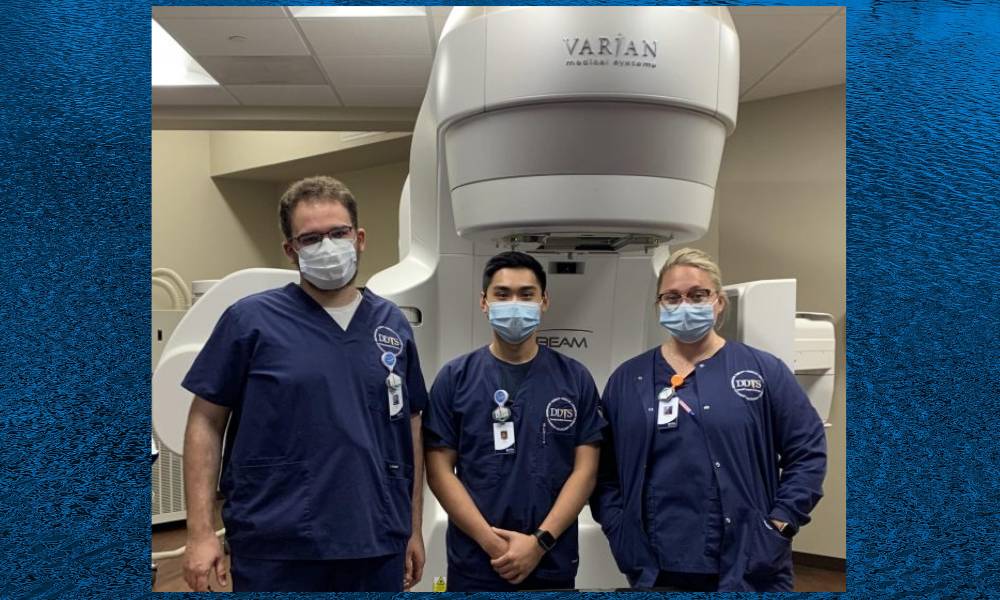
Sewing isn’t a skill that radiation therapy student Daniel Clark expected to learn during his time as a student at Georgia Southern University, much less in his academic program.
But when the COVID-19 pandemic altered the 2020 academic landscape, he and six classmates had to pivot to fulfill the community service component of their management and leadership course in the Waters College of Health Professions Radiation Therapy program.
The class decided to sew masks and create a video on the importance of wearing a mask and how to make one. Together, the group made more than 350 masks during the summer semester to donate to their fellow students.
“It was important to me to create masks for my classmates because masks are such a simple and effective precaution in preventing the spread of illnesses,” Clark said. “Ensuring that everyone had access to one they could reuse and wash for as long as they wanted is a big step in keeping other students safe.”
Clark also learned the importance of teamwork through the mask project.
“While learning that I was awful at sewing, I also learned that it’s important to be able to communicate and coordinate with other students for a project like this,” Clark said. “Being able to rely on others to keep our mask production simple and efficient was awesome, and it made the whole process streamlined and straightforward.”
In addition to fulfilling their clinical rotation requirements and keeping up with academics, students spent their summer weekends and nights ironing, hand stitching and learning to use a sewing machine to supply additional masks for faculty and students as they returned to Georgia Southern’s Armstrong Campus this fall.
“These outstanding students have the camaraderie of a team and unanimously decided to attempt the mask project,” said Leisa Kelly, CMD, clinical coordinator for the Radiation Therapy program. “This is pretty impressive considering the fact that none of the students knew how to use a sewing machine prior to this. They all felt like it was their responsibility as future health care workers to set an example by wearing masks and sharing the instructions for making the masks.
“I was impressed by their work ethic and proud of them for persevering in spite of the changes to their schedule,” she continued. “This group epitomizes the nature of health care workers and I am proud to be a part of their education.”
Balancing clinical rotations, personal lives and this project didn’t come without a challenge for the students.
“The biggest challenge was finding the time and resources to produce such a large quantity of masks in such a short time,” Clark said. “Because there are only seven of us, and we were all in our clinical rotations over the summer, the only real free time we had was on weekends. We had to rely on each other to do our parts individually to get the project completed.”
But Clark and his peers like Tommy Chen realized the importance of this project.

“This experience allowed us to see what the medical world is all about,” Chen said. “Everyone in the class coming together and learning how to help the ones around us gave us more of a purpose to continue our educational paths into the medical world.”
Like Clark and Chen, student Amelia Perry also realized the importance of contributing to the community’s well-being.
“Making sure everyone is safe during this pandemic is everyone’s responsibility, and it is going to take help from everyone for us to all get through this,” Perry said. “Creating the masks was important to me because it allowed students, like myself, the ability to go to school and still be as safe as possible.”
Additional masks were donated to the group by Claudia Mills and Sharon Clark, and supplies for the masks were donated by Jennifer Hoopes, an executive assistant in the Waters College of Health Professions dean’s office.


Bulloch Public Safety
02/09/2026 Booking Report for Bulloch County

Bulloch Public Safety
02/16/2026 Booking Report for Bulloch County

Bulloch Public Safety
02/20/2026 Booking Report for Bulloch County

Bulloch Public Safety
02/17/2026 Booking Report for Bulloch County

Bulloch Public Safety
02/02/2026 Booking Report for Bulloch County









